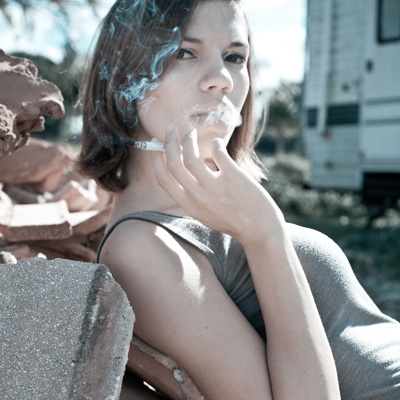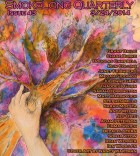Tell us a little something about the inspiration for “White Guys Are All the Same.”
In 1981 and ’82, I got two jobs in the bush in Alaska: as a dispatcher/jail guard, and as a detox ward attendant for Phillips Alcoholism Treatment Center in Bethel. This story is based on my experiences during that time. I worked those two jobs concurrently, 16 hours a day. There’s not much else to do up there.
There is a very pointed and interesting distance that the narrator inserts into this story— “the one of us who is Mike and the one who is not Mike”—dropping a name yet never firmly identifying himself or his partner. What does this anonymity do for him?
In those circumstances, there is a very definite us-and-them mentality that sets in, much like war, and it serves to generalize culpability and memory. I often wonder if my memories of that time are not conflated with those of every other white guy I was working with. Also, the way you’re regarded by the locals as just another “gussuq” tends to reinforce that. In a place that seems to lack any sense of time or hold any memory of you, who gives a shit who you are? Either you’re native or you’re not. Interesting side note: “gussuq” comes from the term “Cossack,” as in Russians, as in the first white folks these people saw. I was told by a native speaker that the term for black person is “sthusthpuq” as in “suspect”. They’re not real big on political correctness out there.
Regarding the narrative voice and the use of anonymity: I think it’s actually something more like ubiquity. There’s just a mass of white guys in the midst of this community. Whoever the narrator is could be any one of them.
This piece centers on tough racial tensions and the legacy of American colonialism (an indigenous population simmering with resentment; paternalistic authorities simmering with a sense of white male aggrievement). Are you frequently drawn to racial conflict in your writing? Reading? What attracts you to this subject?
I grew up in Pontiac, Michigan, in the late 60s/early 70s in an all-black neighborhood. It was known at the time as the “Selma of the North.” In 1971, our school buses were blown up by the KKK, if that gives you any idea how fucked up things were. I wouldn’t say that I’m frequently drawn to racial tension in my writing. It just comes up because I lived with it. The bulk of the racial tension I dealt with in my life was not from “people of color”, it was from really scared white people. I’m Scottish by descent so I’m about as white as chalk. I wouldn’t call myself a racist although I seem to feel better around brown people.
When I went to the bush after my first semester of college, I didn’t encounter racial tension per se as much as I encountered blatant racism (mostly in the form of name calling), especially when working for the police. Not everyone on the force was white as they are in my story. There were people of every ethnicity, although the majority of them were white. And certainly the ones in command were white.
What affected me most deeply during my time there was witnessing the sheer resilience of the native people. I know that I’m generalizing here, and generalization is its own kind of racism, so please forgive me. I don’t know of a better way to express something that I experienced as a shared trait among the Yup’ik of central Alaska. They have been unfairly profiled in the past as drunken, profligate, and pitiable. Bethel was dubbed by Senator Teddy Kennedy as “the worst slum in the world.” Granted, he was only talking about the living conditions. But it’s comments like that that seem to extend to the people themselves and that’s not fair. No foreigner like myself will ever know life as they know it. Never mind their stoicism, their language itself is impenetrable to Western speakers.
As far as my reading is concerned, I’m not really drawn to stories with racial tension because I find them just too upsetting. Hell, I cried like crazy while I was writing “White Guys.” And then I cried again when I read it to my wife. The only way it got written was that I doused myself with enough courage (read: vodka) to take it to the page. You probably wouldn’t be surprised to find out at this point that all the events described in the story actually occurred and that the recollection of those events was very upsetting to say the least. Life writes a shitload better than I do. But all that said, I really think books like Bullwhip Days and Bury My Heart at Wounded Knee, no matter how shocking and difficult they are, should be required reading in our public schools.
After reading this story, the image that sticks with me most is that of poor Aggie downing Pine Sol in the janitorial closet—an image both tragic and darkly absurd. So, as a final note, I have to ask: what’s the worst thing you’ve ever drunk?
Worst? In the past, I drank some pretty awful stuff on purpose: 190-proof Everclear, some ghastly homebrew, some kind of tea made out of mushrooms and hash oil, to name a few. I got amyl nitrate in my mouth once in college, which I do not recommend. But out of all of that, the time when I was eight years old and I accidentally drank dirty crankcase oil out of a NuGrape can that was left on my father’s desk in the garage is the worst. It doesn’t get nastier than that. Or more surprising.



 The SmokeLong Grand Micro Contest (The Mikey) is now an annual competition celebrating and compensating the best micro fiction and nonfiction online.
The SmokeLong Grand Micro Contest (The Mikey) is now an annual competition celebrating and compensating the best micro fiction and nonfiction online.